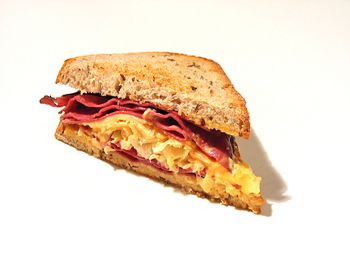Reuben sandwich
- See also: Sandwich
- See also: American cuisine
A Reuben sandwich is usually made with rye bread, corned beef, sauerkraut, Swiss cheese, and Russian dressing or Thousand Island salad dressing, and is griddled, grilled, or fried and served hot. The corned beef is sometimes replaced by pastrami or thinly sliced ham; the sauerkraut sometimes replaced with cole slaw. The sandwich can also be served cold.
The Reuben sandwich is part of American food folklore and is often associated with Jewish food traditions even though all its variants combine meat with cheese and therefore are not kosher.
Origin
Conflicting stories exist about the origin of the sandwich. The two main competing ones are:
- The Reuben sandwich was named for Arnold[1] Reuben, who, in the early party of the 20th century, owned the now-closed Reuben's delicatessen in New York. Reuben reportedly created the sandwich to honor Annette Seelos, an actress, in 1914.
- Alternatively, the sandwich was created by Reuben Kay, a Omaha, Nebraska, grocer, who made the sandwich during the course of a poker game. His sandwich then won a national contest the following year.
In order to clarify the etymology of Reuben sandwich for the Random House College Dictionary Jim Rader, of Merriam-Webster thoroughly researched the two claims but without arriving at a definite answer.
New York: Arnold Reuben
Arnold Reuben was the founder and owner of Reubens, from 1935 to the mid-60s a fashionable landmark restaurant in New York on East 58th Street near Fifth Avenue; it was famous for its sandwiches created for and named after celebrities. According to a 1938 interview, he created his first star sandwich—consisting of bread, "some meat and cheese" and "some spice and stuff"—to impress an actress named Anna Selos during World War I when his delicatessen was situated on Broadway: this was the first Reuben Special.
This episode was then told in an expanded version by Reuben's daughter, Patricia R. Taylor, in a 1976 letter to the New York Times food columnist Craig Claiborne. According to her, the invention of the sandwich took place in 1914 (before the delicatessen had been moved to Broadway) and involved an actress named Annette Seelos (not Anna Selos), who was said to be playing in a recent Charlie Chaplin movie. In her account the sandwich was made of rye bread, "with sliced baked Virginia ham, sliced roast turkey, sliced imported Swiss cheese," and topped "with cole slaw and lots of Reuben's special Russian dressing". James Beard, the noted American cook and cookbook author, also remembers Reuben sandwiches from his youth as being made with turkey as an ingredient—and as frequently being made on thick pumpernickel instead of rye bread.[2]
According to the son, Arnold Reuben jr., (1993, to the St. Petersburg Times), the sandwich was created later, in the 1930s, by Alfred Scheuing, chef at the Reubens, who served it to him as a change to the else usual hamburger. It was made with "Russian dark pumpernickel bread, which he had buttered and toasted", fresh corned beef, Swiss cheese, and fresh sauerkraut.
Omaha: Reuben Kulakofsky
In the 1920s, Charles Schimmel was the owner of Blackstone Hotel in downtown Omaha where poker games would take place regularly. As told later (1965 and 1968) by his son Ed Schimmel, at some opportunity one of the players, Reuben Kulakofsky, a local grocer, came up with the idea to combine rye bread, corned beef, Swiss cheese, and sauerkraut, a recipe that, because of its success, was introduced (as Reuben sandwich) into the menu of the hotel's restaurant.
This version is supported by Louise Ware who (in 1989) told that she once, in 1922, had visited her uncle Harvey Newbranch during a poker game at the Blackstone and was served a sandwich made with "corned beef, sauerkraut, and so forth".
References
- ↑ Frequently, in secondary sources, mistakenly referred to as Arthur, for instance in the apparently authorative The New Food Lover's Companion, Sharon Tyler Herbst, Barron's, Hauppauge, New York, 1995, ISBN 0-8120-1520-7, page 478
- ↑ James Beard's American Cookery, James Beard, Little, Brown & Company, Boston, Library of Congress Catalog Card No. 70-165755, page 805
